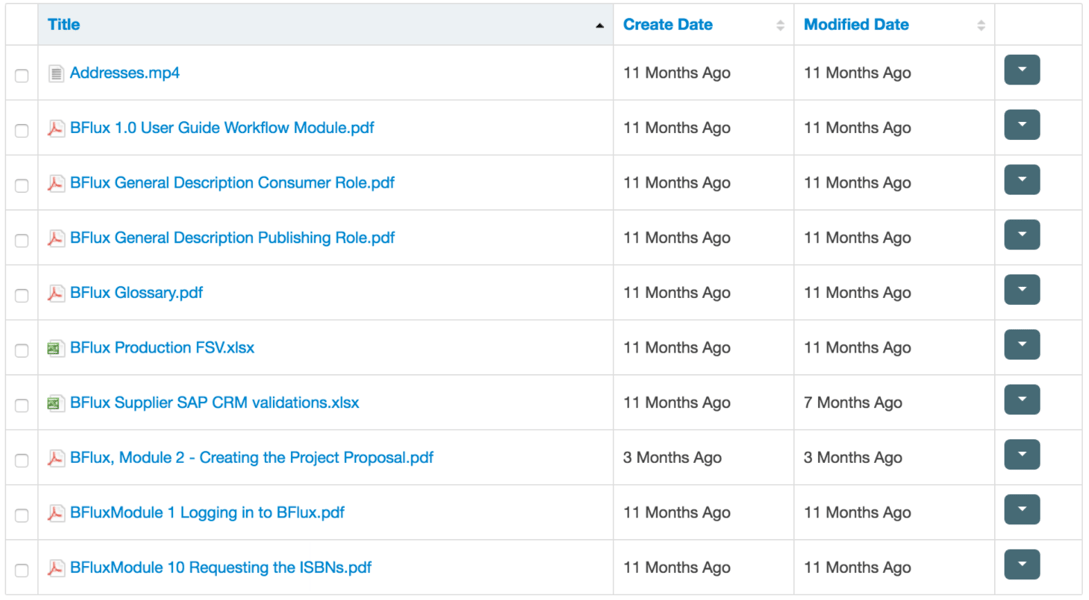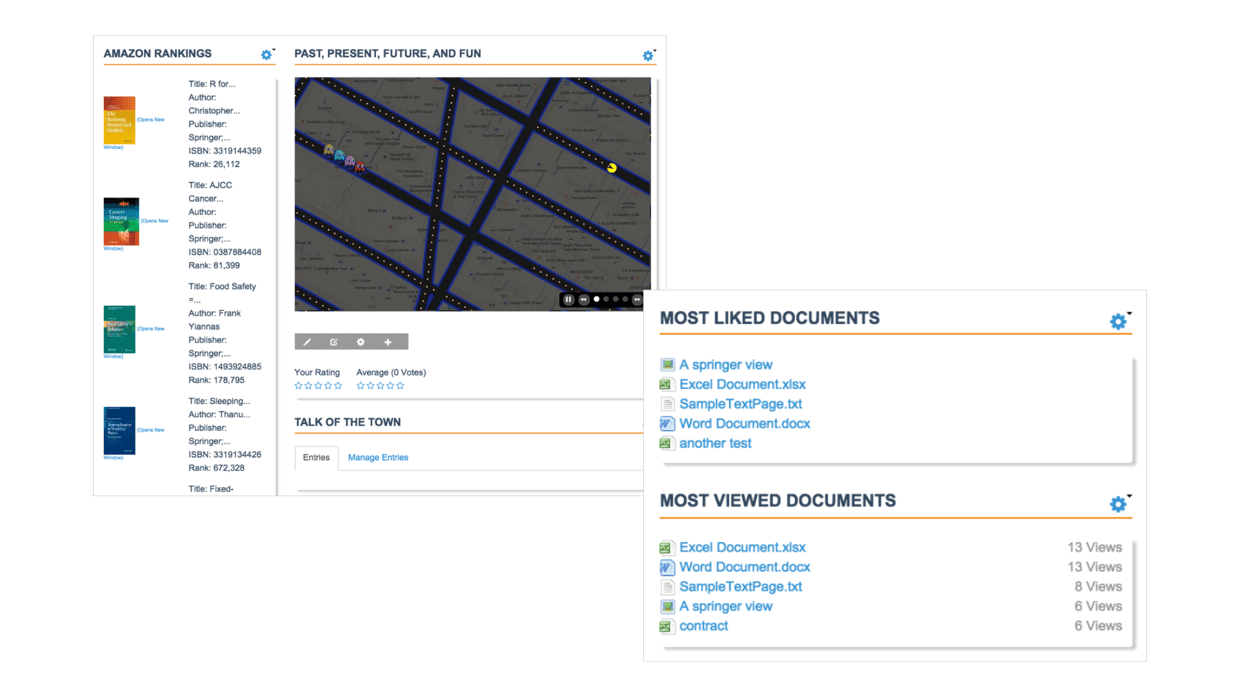
.jpg?auto=compress,webp&upscale=true&width=1920&height=560&name=blurry%20image%20of%20books%20(1).jpg)

Challenge
Springer Nature needed to replace Microsoft SharePoint due to rising costs. The new solution had to serve as a central collaboration platform and gateway to other internal systems and tools.
Solution
We migrated Springer's SharePoint environment to Liferay DXP. After analyzing their setup, we designed a structured platform where each department had its own subsite. We built an interface to streamline content migration and implemented the SimpleEdit plug-in for seamless document editing.
Result
Using an Agile approach, we worked in short cycles with regular feedback sessions. Springer was closely involved throughout the process, gaining full transparency and confidence. The result? A well-structured, user-friendly platform tailored to their needs.
About Springer
Springer was founded in Germany in 1842 as a small publishing company and bookshop. After more than 175 years, Springer Nature has grown into one of the world’s largest publishers of academic journals and books:
- 300.000+ books published
- 2.900 journals, including Scientific American and Nature
- Leading provider of specialized scientific and professional content
Challenge
One central collaboration platform and portal
Springer Nature had been using Microsoft SharePoint for internal collaboration and information exchange. Partly due to rising costs, Springer decided to completely dismantle and replace Sharepoint. The replacement solution had to serve as:
- one centralized collaboration platform
- a gateway to Springer's other internal systems and tools
- provide a smooth integration with Microsoft and other software
Thanks to better pricing and easy integration with other software products, Springer chose a platform based on Liferay as the new solution. Liferay referred them to ACA Group, the only Liferay Platinum Partner in Belgium, for the migration from SharePoint to Liferay DXP.

Solution
Migration from Sharepoint to Liferay DXP
Project start
We started the project at Springer with a five-day workshop. During this workshop, we precisely analyzed the use of the Sharepoint environment. We discovered that each department had its own collaboration platform and document library, along with various tools such as Confluence for knowledge sharing, Jira for project tracking, shared network drives for document storage and Google Docs. The diversity of tools made it difficult to structure data and quickly find information.
Structure and migration to Liferay DXP
With the outcome of the workshop, we proposed a structure in which the different departments and locations at Springer have their own spot in the form of a subsite within the new Liferay platform. We then linked the correct information in this new structure. The structure was further updated and formalized through mock-ups. This allowed us to test the user interface of the design early in the development process and arrive at a clear structure and interface.
After the structural stage of the project, we started the migration of all content from the Sharepoint platform to the new platform based on Liferay. For the data migration, we built an interface that serves as an export format for Sharepoint and at the same time as an import format for Liferay DXP. We could easily map similar concepts between the two systems, such as sites and documents. We defined more complex transformations for deviating concepts such as complex data lists. Through a number of workshops, we taught Springer how they could do this themselves. Springer Nature was then able to independently use the custom migration tool to migrate all content from Sharepoint to Liferay DXP.
Increased usability
The employees of Springer Nature are used to working with Microsoft tools such as Microsoft Office. To further increase the ease of use and to offer them the possibility to adapt content as easily as in Sharepoint, we installed the SimpleEdit plug-in on the Liferay platform. Thanks to SimpleEdit, a plug-in that we built ourselves, it is possible to edit Office documents directly from any Liferay environment.
Steps in the Liferay DXP migration process

Result
Built according to a transparant and agile approach
Springer Nature mainly worked in a more traditional way, and was less familiar with the Agile approach that we prefer. During this project, we also worked according to our Agile approach and involved Springer very closely in the migration and development process.
We worked in iterative cycles of two to three weeks. After each cycle, we made room for a feedback moment with the stakeholders of Springer Nature, so that we could continue to improve. Then we delivered a workable test version. This allowed Springer to test, adjust and improve the software, which allowed us to make adjustments quickly and flexibly. This way, Springer was also easily kept informed of the progress of the project.
Finally, we also gave Springer full access to our online tracking system. That way, Springer could see exactly what we were working on at the time. Although Springer Nature was not familiar with such an approach, this transparency gave them a lot of confidence in our way of working. Throughout the entire process, Springer was positively surprised and very enthusiastic about this way of collaboration.
Ready to upgrade your collaboration platform?
Let's discuss how we can help you migrate to Liferay DXP.

Ready to upgrade your collaboration platform?
Let's discuss how we can help you migrate to Liferay DXP.

Ready to upgrade your collaboration platform?
Let's discuss how we can help you migrate to Liferay DXP.

Ready to upgrade your collaboration platform?
Let's discuss how we can help you migrate to Liferay DXP.

Related cases
Springer isn’t the only organization that has streamlined collaboration and improved efficiency with Liferay DXP. Explore our other success stories to see how we’ve helped businesses transform their digital platforms!
Renson partnered with ACA Group to develop user-friendly apps for controlling patio covers, shading, lights, heaters, and air quality systems. Overcoming diverse hardware and network challenges, ACA delivered seamless solutions, including a rapid two-week rollout of CO\u2082 monitoring features during the pandemic.


Stad Hasselt is undergoing a digital transformation to bring city services closer to their residents. To ensure the mobile app was intuitive and user-friendly, we conducted expert UX reviews and real-world user testing. The result? A highly rated city app that makes accessing services easier than ever.


To improve its customer journey and online presence, Attentia partnered with ACA Group to create a future-proof website. By replacing multiple fragmented platforms into one website, Attentia optimized their #OneAttentia experience. Customers can now easily access the right services while enjoying increased efficiency, stronger branding, and greater engagement.


To ensure the safe and efficient transport of their renowned beers, Duvel Moortgat needed a more reliable way to detect damaged pallets. ACA Group developed an AI-powered Computer Vision solution that automatically identifies defects, improving quality control, reducing costs, and increasing operational efficiency. This innovative approach highlights the power of AI in optimizing production processes.


The most rewarding partnerships are those where a supplier actively contributes to a customer’s growth. That’s exactly what ACA Group has been doing with MobilityPlus for over a year. What started as a mobile app for EV charging has evolved into a full digital ecosystem, including a web portal, an Azure data platform, and AI-driven solutions. With ACA’s expertise, MobilityPlus is transforming into a data-driven company, shaping the future of sustainable mobility.




Renson partnered with ACA Group to develop user-friendly apps for controlling patio covers, shading, lights, heaters, and air quality systems. Overcoming diverse hardware and network challenges, ACA delivered seamless solutions, including a rapid two-week rollout of CO\u2082 monitoring features during the pandemic.


Stad Hasselt is undergoing a digital transformation to bring city services closer to their residents. To ensure the mobile app was intuitive and user-friendly, we conducted expert UX reviews and real-world user testing. The result? A highly rated city app that makes accessing services easier than ever.


To improve its customer journey and online presence, Attentia partnered with ACA Group to create a future-proof website. By replacing multiple fragmented platforms into one website, Attentia optimized their #OneAttentia experience. Customers can now easily access the right services while enjoying increased efficiency, stronger branding, and greater engagement.


To ensure the safe and efficient transport of their renowned beers, Duvel Moortgat needed a more reliable way to detect damaged pallets. ACA Group developed an AI-powered Computer Vision solution that automatically identifies defects, improving quality control, reducing costs, and increasing operational efficiency. This innovative approach highlights the power of AI in optimizing production processes.


The most rewarding partnerships are those where a supplier actively contributes to a customer’s growth. That’s exactly what ACA Group has been doing with MobilityPlus for over a year. What started as a mobile app for EV charging has evolved into a full digital ecosystem, including a web portal, an Azure data platform, and AI-driven solutions. With ACA’s expertise, MobilityPlus is transforming into a data-driven company, shaping the future of sustainable mobility.




